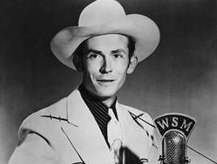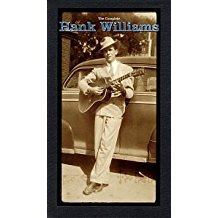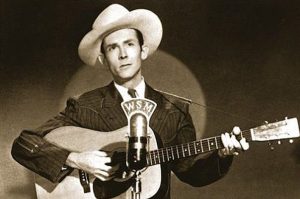PUBLISHED IN THE TORONTO STAR ON TUESDAY, SEPTEMBER 29, 1998
New Lavish CD set celebrates country music star Williams
By Nick Krewen
Special To The Star
September 29, 1998
If he were still alive, country maverick Hank Williams would have been 75 on September 17.
And you didn’t bake a cake to mark the birthday of the man who gave us such timeless classics as “Honky Tonkin’,” “Lovesick Blues” and “Cold, Cold Heart?”
Don’t fret. Several ceremonies and celebrations did trumpet the occasion.
Among the most notable:
· The opening of a new Hank Williams museum in Montgomery, Alabama.
· A bus caravan sponsored by The Country Legends Association retraced Williams’ unfinished journey from Charleston, West Virginia to his final concert stop of Canton, Ohio. Williams died mysteriously in the back of his Cadillac en route to Canton, sometime between December 31, 1952 and January 1, 1953, by what was later determined as heart disease. CLA travelers capped the tour by attending a performance at Canton Memorial Auditorium by Hank Williams III, the spitting image of his late grandfather. Surviving members of Williams’ backing band The Drifting Cowboys also performed.
· Musical instrument manufacturers C.F. Martin & Co. introduced the D-28HW Hank Williams Sr. Limited Edition Guitar. Only 150 of these special edition numbered guitars were produced and sold — exact replicas of Williams’ preferred brand.
· A “Poet Of The People” Art Exhibit, currently displayed at Nashville’s Country Music Hall Of Fame, includes work by the late American actor Jimmy Stewart, artists Howard Finster, Lamar Sorrento and sculptor Buddy Jackson.
However the most accessible and comprehensive contribution to celebrate Williams’ legacy arrives in Canadian record stores today.
Priced at approximately $200, The Complete Hank Williams is a thoroughly researched, lavishly packaged nine-hour, 10 CD set that contains Williams’ entire recorded output from 1939 through his final MGM session on September 23, 1952.
Of the 225 studio, demo, concert and radio recordings assembled by noted Toronto author Colin Escott, Mercury Nashville executive Kira Florita and Nashville’s Country Music Foundation, 53 are previously unissued.
The extensive set also comes packed with essays, a timeline, rare photos, superstar quotes and even the songwriter’s handwritten lyrics to some of his most popular classics.
Many of the musical and visual contributions to The Complete Hank Williams come courtesy of countrybilly singer and songwriter Marty Stuart.
“Hank’s sister Irene died in 1995, and Marty Stuart bought her archive,” says Escott, the 49-year-old author of Hank Williams: The Biography (Little, Brown & Co.) and producer of several acclaimed Williams anthologies including The Original Singles Collection Plus and The Health And Happiness Shows .
“There were a lot of photos, letters, and acetates made from very, very early in his career.”
The archives of Country Music Foundation and Nashville-based publisher Acuff-Rose Inc. were also mined, resulting in some historically significant discoveries.
“Prior to this set, the earliest recordings we had were from late 1946,” asserts Escott.
“Now we have recordings dating back to the late ’30s when he was 16, which show that the character and consistency of Hank’s songwriting was instilled from the get-go.
“Hank Williams did little that those who had come before him had not done — but he did it better, and he did it with a compelling vision. He reached into the darkness within himself and found vivid, haunting images that he delivered with skewering passion.”
That character, brilliantly foreshadowed by Williams’ poignant, naked tenor on 1942 versions of original songs “I’m Not Coming Home Anymore” and “Won’t You Sometimes Think Of Me,” has transcended genre, inspiring such artists such as pop crooner Tony Bennett, blues ambassador Clarence “Gatemouth” Brown, cult bluegrass rockers The Grateful Dead and slide guitarist George Thorogood to sample the Hank Williams canon.
Although Williams died at 29, his impact on country music is immeasurable. From the time he released his first official recording “Calling You” on Sterling Records in 1947 until his death seven years later, Williams placed 33 straight songs on the charts. Only two of them failed to reach the Top Ten.
“He certainly had an unsurpassed string of hits,” admits Escott, who spent the past two years co-ordinating The Complete Hank Williams.
“Everything he released was pure of heart and free of compromise. He died before he had a chance to make a bad record.”
While his career soared, his personal life soured. The native of Mount Olive, Alabama battled alcoholism, a degenerative back condition and tumultuous romances. He married and divorced his first wife twice, and his alcoholism eventually got him fired from The Grand Ole Opry.
Posthumous berths in The Country Music and Rock Music Halls Of Fame; the Pioneer Award from the Academy Of Country Music and a Lifetime Achievement Grammy Award are only a small measure of the reverence with which Hank Williams is regarded by such country superstars as Alan Jackson, George Jones and Emmylou Harris.
“Hank Williams is still in my opinion the best writer of country songs to this day,” says Willie Nelson, another disciple. “His songs were so real and honest and poetic and prolific. We still do a lot of Hank Williams in our set every night. ‘Jambalaya’ and ‘I’ve Got A Hole In My Bucket’ are favorites.”
For Colin Escott, it’s also a case of simple appreciation.
“I just love Hank’s music,” he says. “I’m just happy to be involved.”



